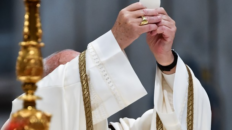READINGS: 1 Kings 19:4–8/ Eph. 4:30–5:2/ John 6:41–51
Theme: The Real Presence of Jesus in the Eucharist
19th Sunday in Ordinary Time
In the first reading, an angel fed the prophet Elijah to enable him journey to Mount Horeb, the mountain of the Lord (1 Kings 19). We are also making a journey, not to a physical mountain of the Lord, but into the highest heaven – into the very eternal blissful presence of the Lord. And to enable us make this journey, we are fed, not by a mere angel, but by the very King of angels, Jesus Christ himself. And Jesus feeds us not with a mere physical food – for we are making not a physical journey but a spiritual one – but with the Eucharist, the Sacrament of his precious body and blood. Today’s gospel reading (a continuation of those of last two Sundays) affords us the opportunity to once again meditate with deep faith what we receive in the Holy Eucharist or Holy Communion.
In the Holy Eucharist, the bread becomes truly the body of Christ and the wine the blood of Christ. However, years after our FIRST Holy Communion, for some of us familiarity seems to be breeding contempt for the body and blood of Christ. Some of the Jews were so familiar with Jesus that many of them did not believe him when he said that he had come down from heaven; they retorted: do we not know his father, Joseph [the carpenter], and the mother as well; how can he claim he has come down from heaven? (John 6:35-42). Like those unbelieving Jews, we have been affected by the disease I call, ACQUIRED FAMILIARITY DEFICIENCY SYNDROME (AFDS). That is, some of us have become so familiar with the Holy Communion that our faith in what (the body and blood of Christ) we are receiving has become deficient. Or, to put it another way: has your reception of Holy communion become so routine that, though you say ‘Amen’ to the priest’s invitation of ‘the body of Christ’, you do not consciously receive the Lord with genuine faith and due reverence? In this case we may refer to the disease affecting you as the ACQUIRED ROUTINE DEFICIENCY SYNDROME (ARDS). Probably such familiarity and routine account for our inadequate preparations for the worthy reception of Holy Communion.
As we heard last Sunday, the day after the multiplication of loaves to feed the 5,000 men, Jesus told the crowd that they should look not for the food that perishes but for that which gives eternal life. Then when the people requested for this bread of life, Jesus told them that he is the bread of life that has come down from heaven. They then started grumbling. But Jesus’ further statements were to shock the people the more: ‘If anyone eats this bread, he will live forever. The bread that I will give him is my flesh, which I give so that the world may live. This started an angry argument among them. “How can this man give us his flesh to eat?” they asked. Jesus said to them, “I am telling you the truth if you do not eat the flesh of the Son of Man and drink his blood, you will not have life in yourselves. . . For my flesh is real food and blood is real drink”’ (John 6:51-55). Consequently many of his followers left him.
Now if Jesus did not mean what he was saying (that he will give us his flesh and blood), or if he was using a mere figure of speech, he would have called the deserting followers back to clarify his teaching. Rather, he turned to the twelve apostles and asked them if they also wished to leave him. Peter, then, responded: ‘Lord, to whom would we go? You have the words that give eternal life. And now we believe and know that you are the Holy One who has come from God’ (John 6:68-69).
However, it was not until the Last Supper that Jesus gave us the sacrament of his body and blood. At the Last Supper, Jesus did not say: ‘Take and eat, this is LIKE my body’; neither did he say: ‘. . . this REPRESENTS my body’; nor did he say: ‘. . . this is a SYMBOL of my body.’ He simply said: ‘. . . this IS my body.’ Likewise, with the cup of wine, he did not use the words LIKE/REPRESENTS/SYMBOL; rather, he simply said: ‘This IS my blood . . .’ We, therefore, believe that in the Eucharist, the bread becomes the true body of Christ and the wine the true blood of Christ.
Let me illustrate the above point with a BBC news item I heard yesterday: four members of the International Criminal Court (ICC) have been detained in Libya for illegally possessing, among other things, a camera in the form of a pen and a recorder in the form of a wrist watch. Would they have been detained for possessing an ordinary pen and wrist watch? No! They have been detained because they possessed a camera (though in the form of pen) and a recorder (though in the form of a wrist watch). Similarly, in the Eucharist, though the form is bread it is truly the body of Christ; though the form is wine, it is truly the blood of Christ! That is why St. Paul asks those whose appreciation of the Eucharist is limited by the forms of bread and wine: ‘Is the bread we break not a communion in the body of Christ? Is the cup we drink not a communion in the blood?’ (1 Cor. 10:16). Subsequently, he states categorically: ‘It follows that if anyone eats the Lord’s bread or drinks from this cup in a way unworthy of him, he is guilty of sin against the Lord’s body and blood’ (1 Cor. 11:27). It is clear that St. Paul does not say the person sins against the blessed bread and blessed wine, nor simply against the bread and wine.
Beloved, as a living person’s body and blood are not separated but they are together with his mind and soul, so in the Eucharist we have altogether the body, blood, soul and divinity of our living Lord Jesus Christ. This is what we call the Real Presence of Jesus Christ in the Eucharist. That is why we should receive the Eucharist with true faith and due reverence; and that is why we can adore Jesus in the Most Blessed Sacrament.
Beloved, before concluding, I want us to pick a lesson from the fact that the prophet Elijah was fed not only once but twice, with the angel giving the reason that ‘the journey is long’; and strengthened by the food, the prophet journeyed for forty days and forty nights (1 Kings 19). Our journey to heaven is longer and so we need to receive Holy Communion as often as possible, while we guard against the deficiencies of familiarity and routine.
Finally, beloved, I pray that we will always genuinely believe in the real presence of Jesus in the Holy Eucharist; that we will always prepare well to receive Holy Communion in a worthy manner; and that anytime we so receive the Lord, he will secure our sound journey to heaven! Amen!
This article was written By Very Rev. Fr. John Louis of frlouis.com




